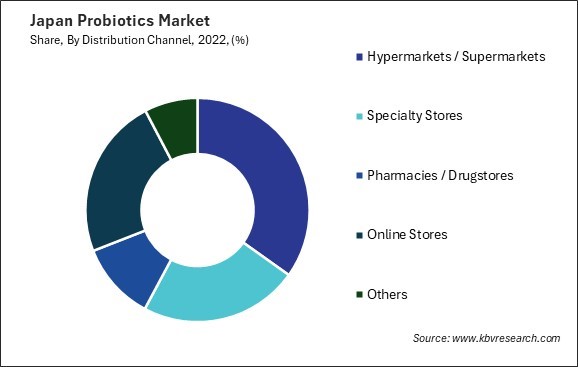The Japan Probiotics Market size is expected to reach $8.8 Billion by 2030, rising at a market growth of 6.7% CAGR during the forecast period.
A key driver of technological advancements in the Japan probiotics market is the increasing focus on strain specificity and efficacy. Advances in microbiology and biotechnology have allowed for identifying and isolating specific probiotic strains with targeted health benefits. This has led to the development of probiotic products tailored to address specific health conditions or meet the needs of different consumer segments, enhancing the market's diversity and appeal.

Furthermore, the progression of technology has facilitated the creation of novel formulations and delivery systems for probiotics. This includes using encapsulation techniques to protect probiotic strains from gastric acid and bile salts, ensuring their survival and efficacy in reaching the intestines where they can exert their beneficial effects. Additionally, advancements in food and beverage processing technologies have facilitated the incorporation of probiotics into a wide range of products, including dairy, beverages, supplements, and functional foods, offering consumers various options to incorporate probiotics into their diet.
Moreover, in regard to immune health, the pandemic has highlighted the criticality of research and development within the probiotics industry. There has been a growing focus on probiotic strains and formulations that specifically target immune function, as well as research into the role of the gut microbiota in immune response. In a post-pandemic world, this increased emphasis on immune health may stimulate product development and innovation in the Japan probiotics market as companies strive to meet the changing demands of consumers.
Additionally, Japan's regulatory environment has played a role in shaping the technological landscape of the probiotics market. The country has established regulations and standards for probiotic products, ensuring their safety, quality, and efficacy. This regulatory framework has provided a supportive environment for innovation while maintaining consumer confidence in probiotic products, contributing to the market's stability and growth.
In Japan, there has been a noticeable rise in the demand for liquid probiotics, reflecting a broader trend towards convenient and versatile probiotic formulations. Liquid probiotics are gaining popularity due to their ease of consumption, suitability for various age groups, and perceived efficacy in delivering live and active probiotic cultures to the digestive system.
Moreover, liquid probiotics are perceived as being more versatile than traditional pill or capsule forms. They can be easily incorporated into various beverages and foods, such as smoothies, juices, and yogurt, allowing for greater flexibility in consumption. This versatility appeals to consumers looking for creative ways to incorporate probiotics into their diets, especially those who may prefer not to take traditional supplement forms.
Additionally, the perceived efficacy of liquid probiotics in delivering live and active cultures to the digestive system has contributed to their growing popularity. Liquid formulations are often designed to protect probiotic cultures from harsh stomach acids, ensuring their survival and viability until they reach the intestines, where they can exert their beneficial effects. This assurance of efficacy has resonated with health-conscious consumers seeking products that deliver tangible health benefits.
Furthermore, the rising interest in gut health and overall well-being has fueled the demand for liquid probiotics in Japan. The burgeoning awareness among consumers regarding the correlation between gut wellness and overall health has led to a heightened emphasis on the preservation of a balanced gut microbiota. Liquid probiotics are widely recognized as a straightforward and efficacious method to promote gastrointestinal well-being, which corresponds with the increasing fascination with proactive health strategies and organic remedies for wellness. Thus, as consumers prioritize health and wellness, liquid probiotics will likely remain popular for those seeking convenient and effective ways to incorporate probiotics into their daily routines.
The rising demand for animal feed is influenced by various economic, social, and environmental factors that have shaped the agricultural landscape in Japan. One of the key drivers of the increasing demand for animal feed in Japan is the country's growing focus on domestic food production and food security. A growing emphasis is being placed on supporting domestic farmers and ensuring a steady supply of high-quality food products in keeping with Japan's long agricultural history. This focus on self-sufficiency has led to increased investment in the livestock sector, driving up the demand for feed to support the growing number of animals raised for meat, dairy, and other products.
Moreover, changes in dietary preferences and consumer behavior have also contributed to Japan's rising demand for animal feed. As incomes rise and lifestyles change, there has been a shift towards a more diverse diet that includes a greater proportion of animal products. This shift in dietary patterns has increased the demand for livestock products, driving the need for a larger feed supply to support the increased production of meat, eggs, and dairy products.
Moreover, the increasing adoption of intensive and industrialized farming practices in Japan has led to a greater reliance on feed additives, including probiotics, to maintain animal health in confined and high-density production systems. Probiotics are used to mitigate the negative effects of stress, such as weaning or transportation, and to support the gut microbiota balance in animals subjected to intensive production conditions. This has resulted in a growing demand for probiotics to optimize animal health and welfare in modern farming practices.
The rising consumer demand for animal products produced through sustainable and ethical practices has also influenced the use of probiotics in animal feed. Probiotics are perceived as natural and environmentally friendly alternatives to traditional growth promoters and antibiotics, aligning with consumer preferences for products that are perceived as safer and more sustainable. As a result, probiotics have garnered more attention as a means to reduce the use of antibiotics in livestock production and improve animal health. Hence, all of these factors will aid in the market's growth.

In the Japan probiotics market, several companies are notable for their contributions to developing and supplying probiotic products for various applications, including human health, animal nutrition, and industrial uses. These companies are known for their expertise in probiotic research, product innovation, and commitment to delivering high-quality probiotic solutions to the Japan market.
One prominent player in the Japan probiotics market is Yakult Honsha Co., Ltd., a Japanese company specializing in producing fermented dairy products, including the well-known probiotic drink Yakult. Probiotic Lactobacillus casei Shirota, which is present in Yakult, is recognized for its potential health advantages, specifically in promoting digestive health. Yakult has a strong presence in Japan and is widely recognized for its probiotic products consumed by millions of people worldwide.
Another key player in the Japan probiotics market is Morinaga Milk Industry Co., Ltd., a leading dairy company involved in probiotic research and development for decades. Morinaga Milk is known for its Bifidobacterium longum BB536 strain, used in various probiotic products marketed for digestive health and immune support. The company strongly focuses on scientific research and has contributed to developing probiotic technology in Japan.
Furthermore, companies like Megmilk Snow Brand Co., Ltd., a major dairy company in Japan, have also made significant contributions to the Japan probiotics market. Megmilk Snow Brand offers a range of probiotic dairy products and supplements that promote digestive health and overall well-being. The company has leveraged its expertise in dairy production to develop probiotic products that meet the evolving needs of Japanese consumers.
Additionally, international companies such as Chr. Hansen Holding A/S and DuPont Nutrition & Biosciences are in the Japan probiotics market. These companies are known for their global leadership in probiotics and offer a wide range of probiotic strains and formulations for various applications. Their presence in the Japanese market reflects the growing demand for high-quality probiotic products and the importance of international collaboration in advancing probiotic research and development.
In conclusion, the Japan probiotics market is characterized by several key players known for their expertise in probiotics and their commitment to delivering innovative and high-quality probiotic products to consumers. These companies play a significant role in driving the growth and development of the probiotics industry in Japan, contributing to the country's reputation as a leader in probiotic research and innovation.
By Ingredient
By Product
By End-use
By Distribution Channel
Our team of dedicated experts can provide you with attractive expansion opportunities for your business.

